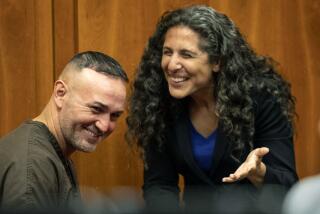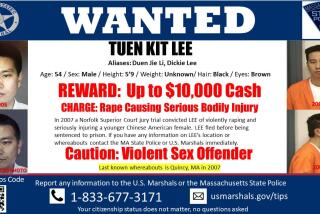$4 Million Goes to Man Wrongly Convicted of Rape
- Share via
FULLERTON — An Orange County law school student who spent three years in prison for a rape he didn’t commit was awarded $4 million Wednesday by a Los Angeles judge who accused the lead investigators of gross abuse of power.
In her ruling, Los Angeles Superior Court Judge Florence Marie Cooper wrote that the case “demonstrates a chilling eagerness to eliminate or explain away all evidence which could . . . exonerate the plaintiff,” Mark Bravo, 38, of Whittier.
Bravo, who was a nurse at Metropolitan State Hospital in Norwalk when a patient accused him of rape, was cheered and hugged Wednesday by fellow students at Western State University College of Law, where he is this year’s Student of the Year.
“I’m cleared. My name is cleared,” Bravo said. “I wasn’t sure I would ever see a decision this favorable. Although I was hopeful, I had this impression that the justice system would not bow down to the rights of the people of the state of California. Boy, was I wrong.”
The financial award Wednesday was assessed against the state because it had conducted the investigation that resulted in Bravo’s undue incarceration.
Bravo’s trouble began Feb. 20, 1990, when he was working at the facility for mental patients. A patient reported to a guard that she had been raped that afternoon. In the course of being interviewed by hospital authorities, she named several people as her attacker, including a man named “Tony Bravo.”
Bravo maintained that he had a solid alibi. He said he had left the hospital grounds at 11 a.m. and had not returned until the afternoon, which he had spent in meetings. According to Bravo, he had gone home that night without knowing that anyone had been raped.
Los Angeles County sheriff’s deputies arrested him at the hospital the next morning. “They put me in handcuffs and whisked me away,” he later recalled.
The trial involved the testimony of a well-regarded supervisory nurse against that of a mental patient who had recanted her story on at least one occasion. Also, other hospital employees could account for Bravo’s whereabouts during the time that the rape supposedly had occurred.
Prosecutors from the state attorney general’s office countered that Bravo was one of only about 3% of the population whose blood type matched that found at the scene. And in the course of the trial, they cited inconsistencies in various statements that he had made, painting him as a liar. In the end, he was convicted and sentenced to eight years in prison.
Then, however, the woman who had accused Bravo of rape recanted and named another man as her attacker. And, although the state Supreme Court had denied his appeals and upheld the conviction, a Los Angeles Superior Court judge ordered DNA tests on various items found at the rape scene: a sheet, blanket and a pair of women’s underwear.
The results of the testing showed that none of the stains found on the items matched the DNA profile of either Bravo or the woman who had been raped. On Jan. 7, 1994, three years after entering prison, the former nurse was released.
“Everybody screwed up,” Sylvia Paoli, Bravo’s attorney, said at the time. “There was a continual, ongoing rash of mistakes.”
Bravo’s attorney, Hermez Moreno, said state law limits the amount of damages that can be awarded to a plaintiff who has been wrongly imprisoned. But federal law does not. Wednesday’s ruling in this case, which was brought as a federal civil rights violation, renders that state ceiling moot, he said.
“The California Supreme Court has pretty much finished the rights of individuals in this state against this type of conduct,” Moreno said. “This case is a vindication to the citizens of this state.”
Deputy Atty. Gen. Laura Gold, who represented the state in the case, said the investigators followed protocol and did their jobs by the book.
“When a patient reports a rape, that is taken seriously even if the patient is mentally ill,” Gold said. “This wasn’t a simple case. It was a complicated case.”
Gold declined to comment on the specific details of the civil rights violations because a decision has not been made about a possible appeal.
Bravo, who will graduate this year, said he wants to work toward changing the law in some way to avoid a “rush to judgment.”
More to Read
Sign up for Essential California
The most important California stories and recommendations in your inbox every morning.
You may occasionally receive promotional content from the Los Angeles Times.













